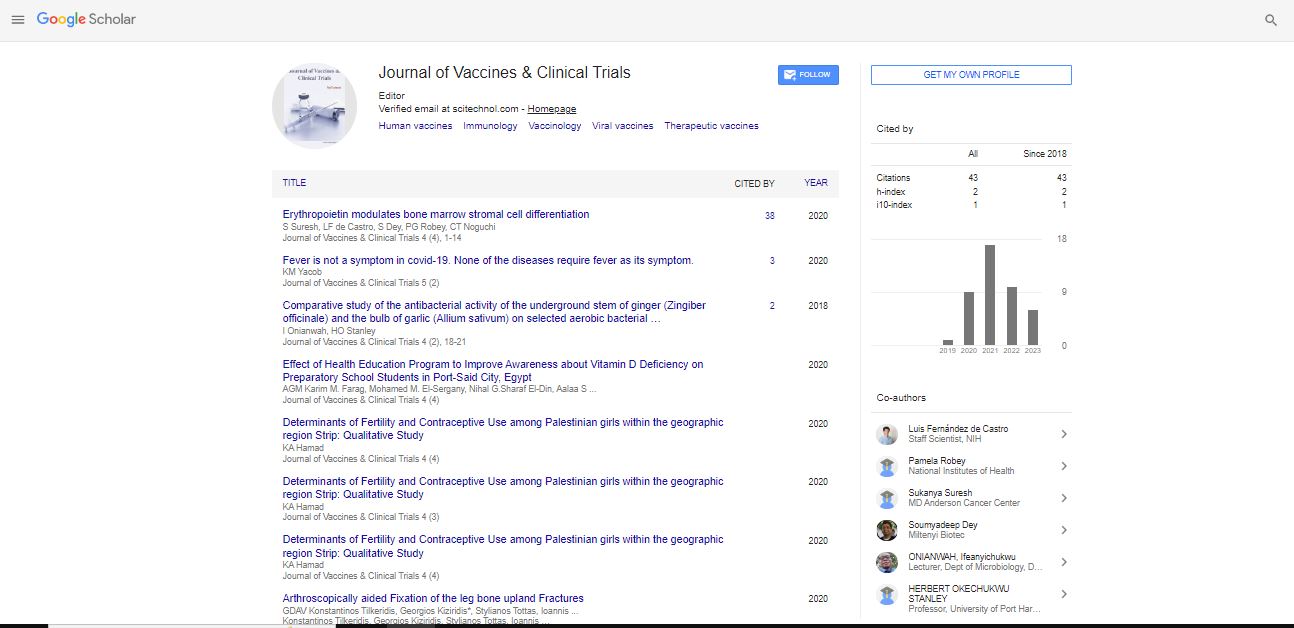Perspective, Jou Of Vac Cli Tr Vol: 7 Issue: 2
Importance and Side Effects of Vaccination for new born at 3rd Day of Birth
Seddig Orsini*
1Department of Pediatrics, Siriraj Hospital, Mahidol University, Bangkok, Thailand
*Corresponding Author: Seddig Orsini,
Department of Pediatrics, Siriraj
Hospital, Mahidol University, Bangkok, Thailand
E-mail: Orsinieg44@hotmail.com
Received date: 29 May, 2023, Manuscript No. JVCT-23-102772;
Editor assigned date: 31 May, 2023, PreQC No. JVCT-23-102772(PQ);
Reviewed date: 14 June, 2023, QCNo JVCT-23-102772;
Revised date: 21 June, 2023, Manuscript No. JVCT-23-102772(R);
Published date: 28 June, 2023, DOI: 10.4172/JVCT.100077
Citation: Orsini S (2023) Importance and Side Effects of Vaccination for new born at 3rd Day of Birth. Jou of Vac Cli Tr 7:2.
Description
Vaccination is a different component of preventive healthcare, protecting infants from various infectious diseases. This study explores the importance of early vaccination at the 3rd day of birth and examines potential side effects associated with this practice. Vaccinating newborns provides early protection against diseases, utilizing the window of vulnerability during the early stages of life. However, as with any medical intervention, vaccines can have side effects, albeit mostly mild and temporary. Understanding the significance of early vaccination and being aware of potential side effects is important for healthcare providers and parents to make informed decisions about infant immunization.
Vaccination in early infancy is essential to safeguard children from life-threatening infections. Administering the first vaccines at the 3rd day of birth takes advantage of the vulnerable period when infants are most susceptible to certain diseases. This manuscript discusses the importance of early vaccination and explores the potential side effects associated with this practice.
Importance of vaccination at 3rd day of birth
Administering vaccines soon after birth offers several advantages:
Protection against early onset diseases: Vaccination at 3rd day of birth ensures early defense against diseases such as hepatitis B, tuberculosis, and tetanus, which can be acquired during childbirth or soon afterward.
Developing immune protection: Vaccination primes the immune system, initiating an early immune response and laying the foundation for long-term immunity.
Prevention of Vertical Transmission: Vaccinating newborns helps prevent the transmission of certain infections from mother to child, such as hepatitis B.
Common vaccines administered at 3rd day of birth
The vaccines typically administered at the 3rd day of birth include:
Hepatitis B vaccine: Hepatitis B vaccination provides protection against this viral infection, preventing chronic liver disease and liver cancer.
BCG vaccine: The Bacillus Calmette-Guérin (BCG) vaccine offers protection against tuberculosis, a contagious disease that can be severe in infants.
Potential side effects of vaccination
Vaccines, like any medical intervention, can cause side effects, but most are mild and temporary. Common side effects associated with vaccines administered at the 3rd day of birth include:
Local reactions: Redness, swelling, or tenderness at the injection site are common and usually resolve within a few days.
Low-grade fever: Infants may develop a low-grade fever after vaccination, which is generally short-lived and can be managed with appropriate care.
Irritability or crying: Some infants may become fussy or irritable after vaccination, but this usually subsides quickly.
Allergic reactions: While rare, allergic reactions can occur. Signs of severe allergic reactions include difficulty breathing, hives, or swelling of the face and throat. Immediate medical attention is necessary if these symptoms occur.
Ensuring vaccine safety and efficacy
To ensure vaccine safety and efficacy, healthcare providers adhere to stringent protocols:
Vaccine safety monitoring: Extensive surveillance systems continuously monitor vaccines for potential adverse effects, ensuring timely detection and intervention.
Vaccine adverse event reporting: Healthcare providers and parents are encouraged to report any suspected adverse events following vaccination to enhance monitoring and evaluation.
Vaccine development and regulation: Vaccines undergo rigorous testing and evaluation by regulatory authorities to ensure safety and efficacy before approval.
Conclusion
Early vaccination at the 3rd day of birth is important for providing infants with protection against potentially life-threatening diseases. While vaccines can have side effects, they are generally mild and temporary. Understanding the importance of early immunization and being aware of potential side effects can help parents and healthcare providers make informed decisions for optimal infant health.
 Spanish
Spanish  Chinese
Chinese  Russian
Russian  German
German  French
French  Japanese
Japanese  Portuguese
Portuguese  Hindi
Hindi 